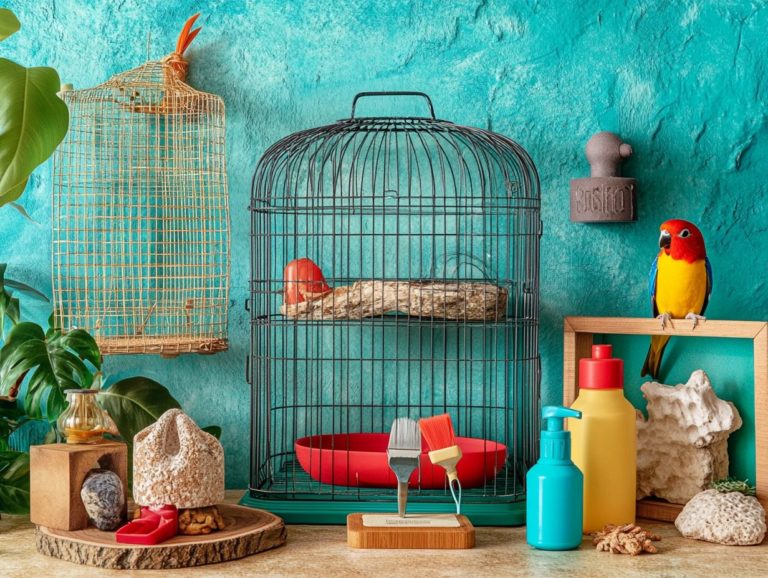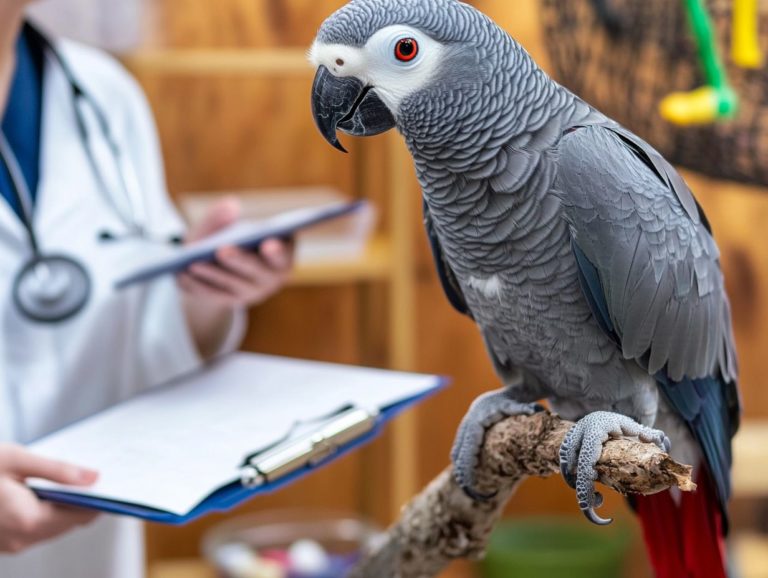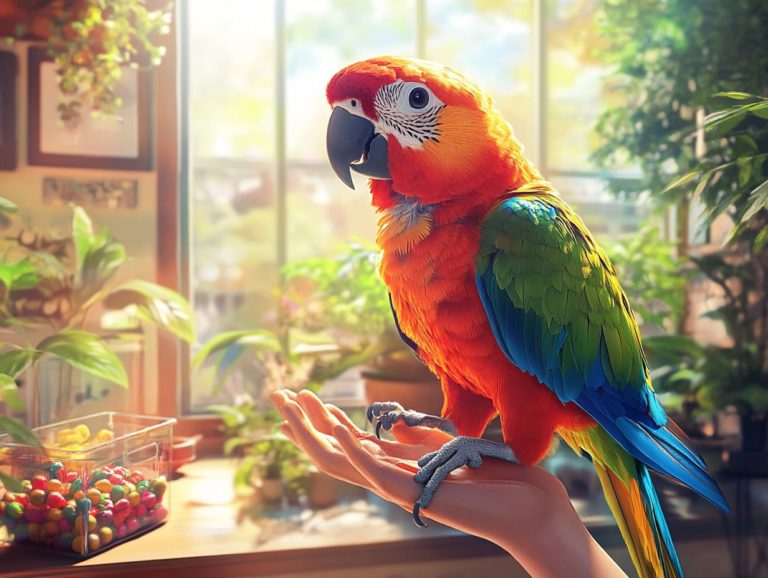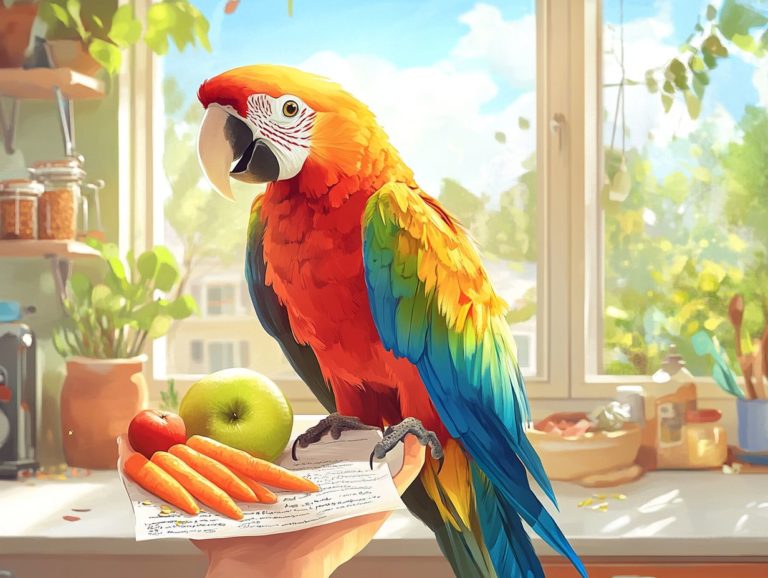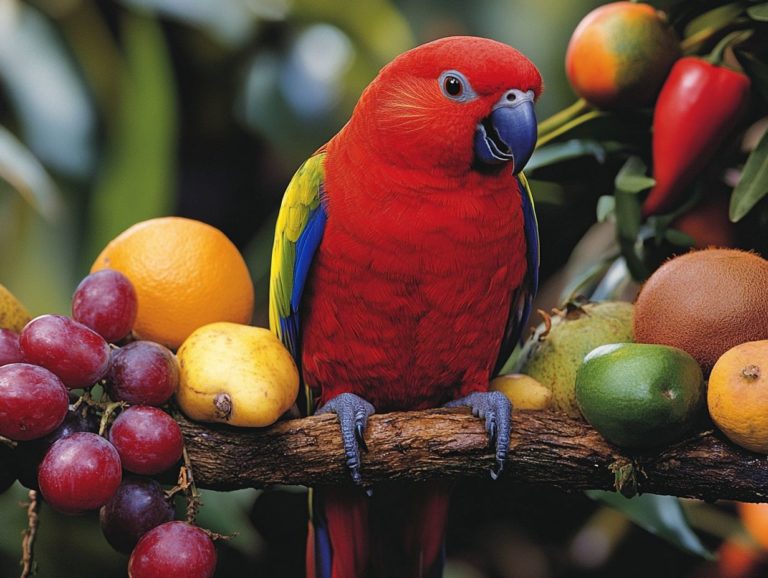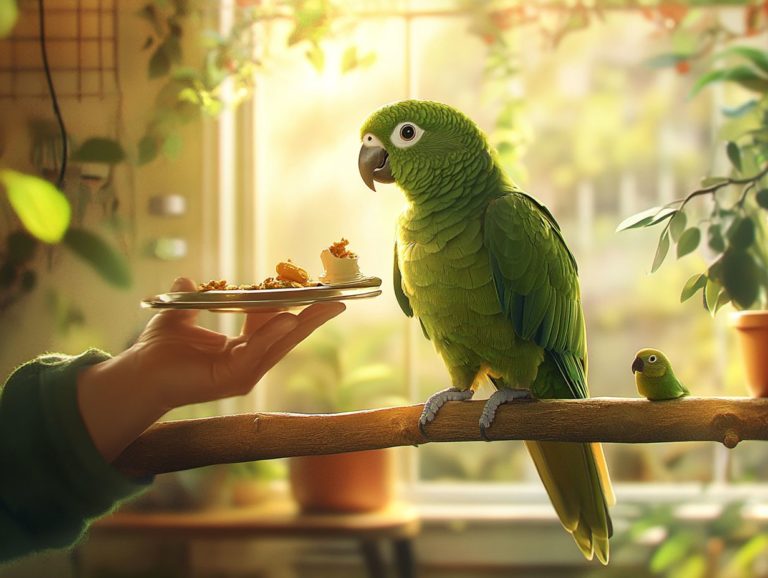5 Common Mistakes New Bird Owners Make
Bringing a bird into your home can be an incredibly rewarding experience, yet it presents its own set of unique challenges. Many new bird owners often stumble into mistakes that affect their feathered friends health and happiness.
From failing to conduct thorough research before adoption to overlooking the importance of socialization and mental stimulation, these missteps can lead to serious consequences. This article delves into five common pitfalls and provides practical tips to ensure your avian companion thrives under your care.
Whether you re a first-time owner or seeking to enhance your bird-keeping skills, this guide will equip you with the knowledge needed to create a nurturing environment for your new friend.
Contents
- Key Takeaways:
- 1. Not Doing Enough Research Before Getting a Bird
- 2. Not Providing Proper Nutrition
- 3. Neglecting to Socialize and Train the Bird
- 4. Not Providing Enough Mental Stimulation
- 5. Not Regularly Cleaning and Maintaining the Bird’s Living Space
- How Can These Mistakes Be Avoided?
- What Are the Nutritional Needs of Different Types of Birds?
- How Can a Bird Be Socialized and Trained?
- What Are Some Ways to Provide Mental Stimulation for a Bird?
- What Are the Best Practices for Cleaning and Maintaining a Bird’s Living Space?
- Frequently Asked Questions
Key Takeaways:
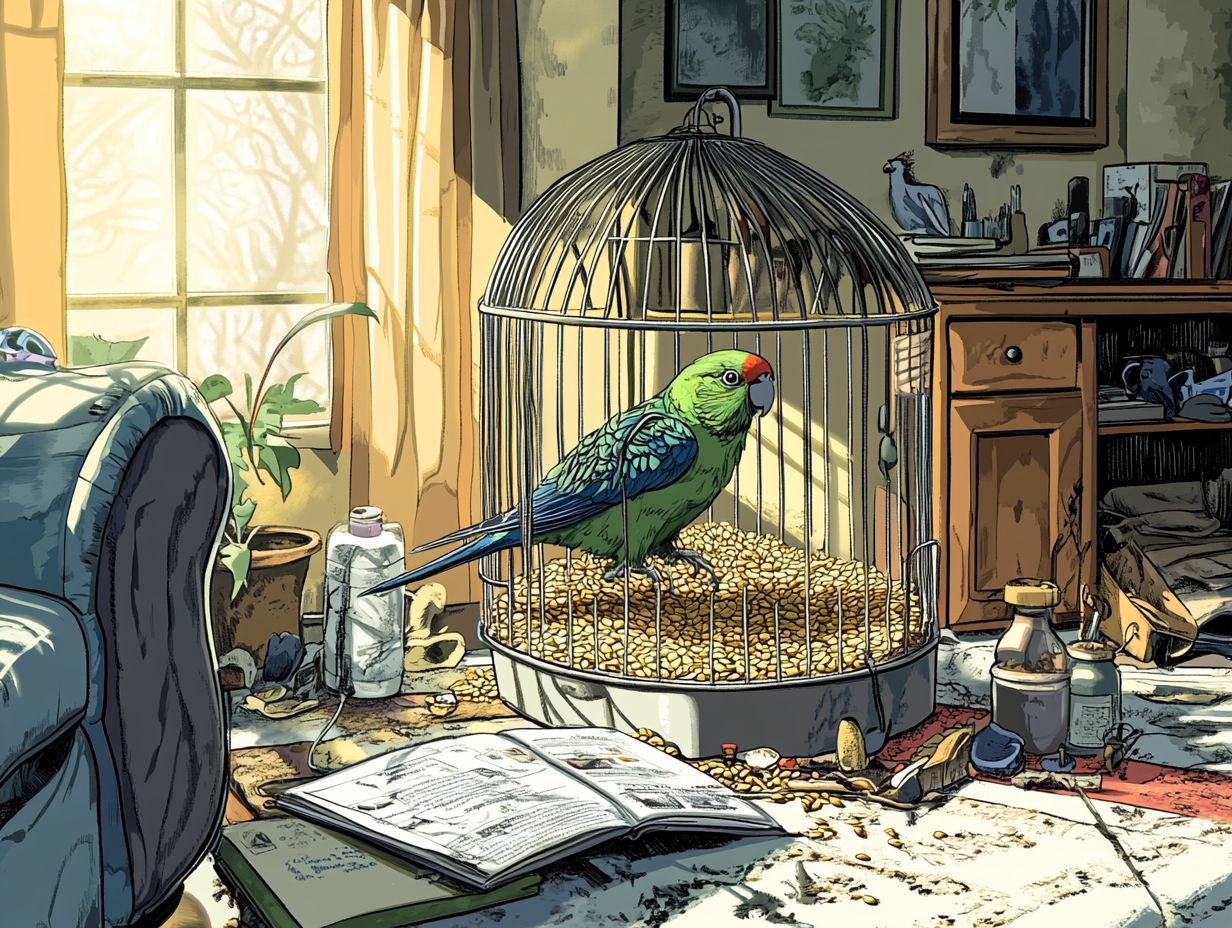
- Proper research is crucial before getting a bird to avoid common mistakes.
- Providing a balanced and species-appropriate diet is essential for a bird’s health and well-being.
- Socialization and training are important for a bird’s mental and emotional development.
1. Not Doing Enough Research Before Getting a Bird
Before you invite an exotic bird into your home, it’s essential to dive deep into the specific needs and characteristics of different species, like the African Grey, cockatiel, and parrot. This preparation ensures you’re fully equipped to provide the care and healthy environment your feathered companion deserves.
Understanding the nuances of each bird’s behavior, dietary requirements, and social needs is paramount. Experts often emphasize that the joy of bird ownership comes with significant responsibilities, including a long-term commitment to their care.
As a potential owner, you should familiarize yourself with the unique traits and challenges associated with various species. This knowledge will help you create a thriving environment where both you and your bird can flourish. Additionally, consider exploring 5 quick tips for feeding your bird to enhance your pet’s diet. By being well-prepared, you can cultivate a harmonious relationship, allowing both the human and avian members of your household to enjoy a fulfilling companionship.
2. Not Providing Proper Nutrition
Providing proper nutrition is vital for the health of your exotic birds. A varied diet that includes fresh foods, birdseed, and special treats is key to achieving the nutritional balance essential for their well-being.
Each species has its own unique dietary needs; for example, some might thrive on a delightful mix of leafy greens, fruits, and vegetables, while others may favor a more seed- or nut-heavy diet. By offering a selection of fresh foods like bell peppers, carrots, and berries, you not only supply essential vitamins and minerals but also elevate mealtime to an engaging experience.
A balanced diet is crucial in preventing nutritional deficiencies and minimizing the risk of food contamination, which can lead to serious health issues. Tailoring food selections to the specific needs of each bird species ensures they receive a wholesome diet that supports optimal health and longevity.
3. Neglecting to Socialize and Train the Bird
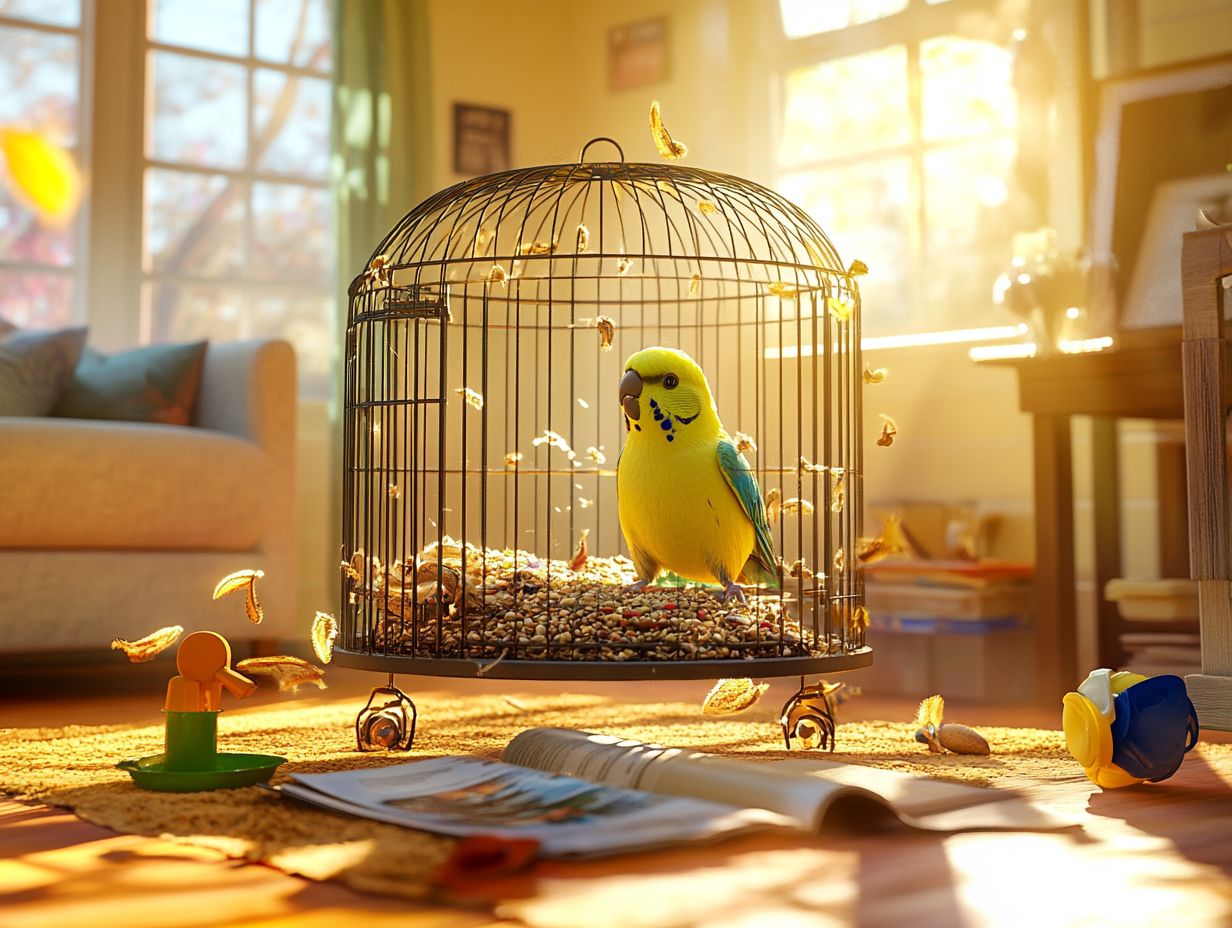
Neglecting to socialize and train your bird will cause behavioral issues, ultimately hindering its overall mental stimulation. This stimulation is essential for your bird s happiness and well-being in an exotic bird care environment.
By using various methods, such as reward-based training think treats or praise you can significantly enhance the interaction between you and your feathered companion. Regular engagement fosters trust and promotes mental agility, allowing your bird to thrive emotionally and cognitively.
Training sessions offer a fantastic outlet for energy, contributing to physical health and reducing stress levels. Experts recommend dedicating just a few minutes each day to practice commands or socialize, ensuring your bird feels secure and understood. This consistency helps cultivate a strong bond, paving the way for a harmonious relationship and a healthier lifestyle for your vibrant friend.
4. Not Providing Enough Mental Stimulation
Mental stimulation is essential for your exotic birds. Neglecting to create an engaging environment filled with suitable bird toys, varied perches, and interactive activities can lead to boredom and behavioral challenges.
Incorporating diverse types of bird toys plays a crucial role in promoting mental engagement. These include:
- Foraging toys – toys that encourage birds to search for food
- Swings – fun toys that allow movement
- Puzzle feeders – toys that challenge your bird to solve problems
These toys allow your feathered companions to explore and truly enjoy their playtime. It’s important to tailor your selection of toys to your bird s personality and species. For example, some may delight in shreddable materials, while others might be captivated by bells and mirrors.
Enhancing their habitat with a variety of perches in different locations and textures encourages exercise and invites exploration. Regularly rotating toys and changing activities will keep their surroundings dynamic and stimulating. This ensures their living space evolves to meet their changing needs.
5. Not Regularly Cleaning and Maintaining the Bird’s Living Space
Regular cleaning and maintenance of your bird’s living space are crucial. Neglecting this responsibility can lead to an accumulation of bacteria and air pollutants that compromise both air quality and the health of your exotic bird.
Establishing a routine for cleaning not only provides a safe haven for your feathered companion but also enhances their well-being and happiness. Select cleaning products that won’t threaten your pet’s sensitive respiratory system. Consider natural alternatives like:
- Vinegar
- Grapefruit seed extract
- Dawn dish soap diluted in water
These options effectively eliminate grime without leaving harmful residues. A cleaning schedule such as a thorough cleaning once a week along with daily spot-checks for food debris and droppings will help you maintain a pristine habitat. This regular maintenance significantly reduces the risk of illness, ensuring your bird remains lively and content.
How Can These Mistakes Be Avoided?
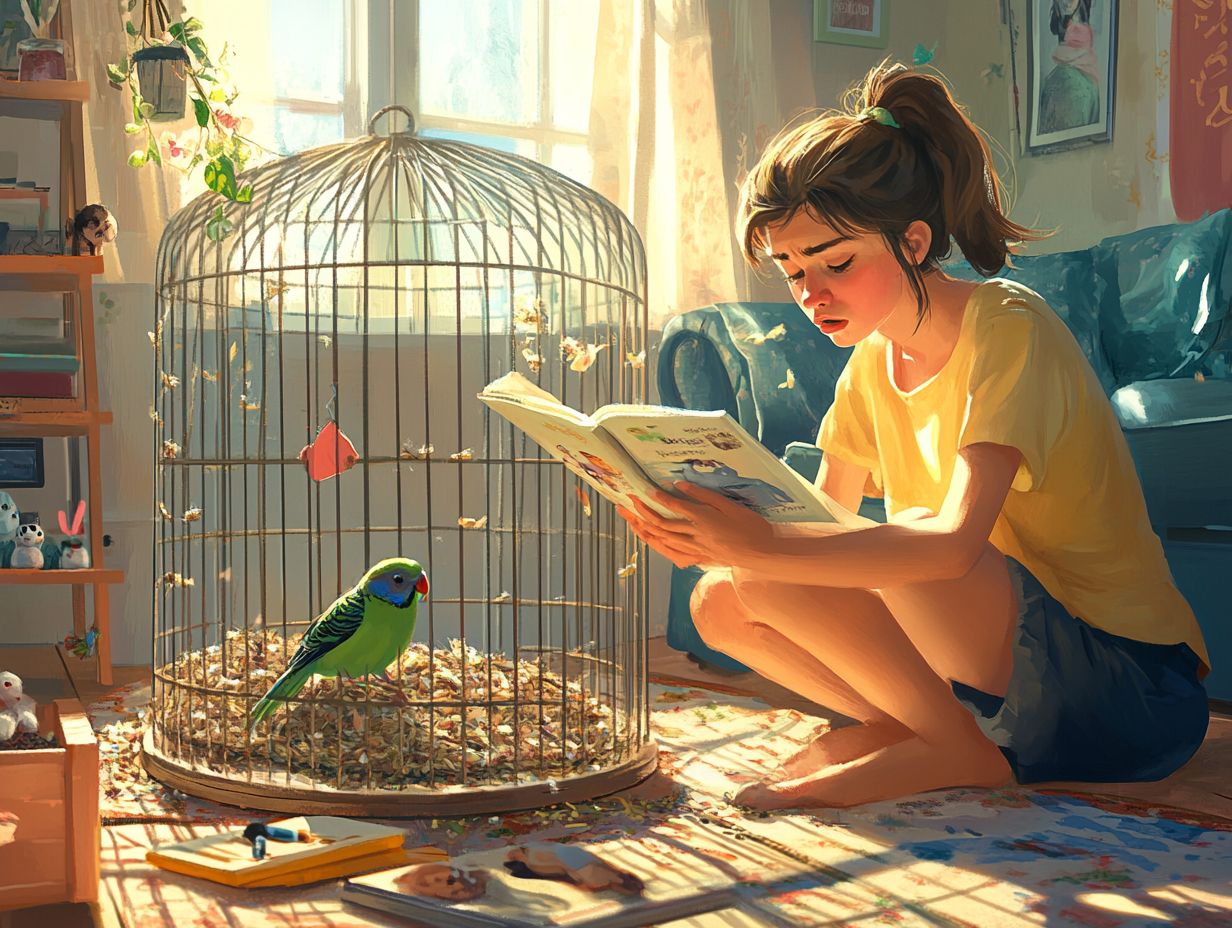
Avoiding common mistakes in exotic bird care demands a proactive stance. Engage in thorough research, provide proper nutrition, and ensure regular socialization. Additionally, being aware of the top 10 bird food mistakes to avoid is essential to promote your birds’ optimal health and well-being.
By embracing these principles, you can cultivate a nurturing atmosphere that supports the physical health of your feathered companions and enriches their emotional and social lives.
Consider creating a checklist that highlights key research topics, such as your birds’ specific dietary requirements and effective socialization techniques that foster interaction.
Craft a detailed nutrition plan that includes fresh fruits, vegetables, and fortified pellets to enhance their overall health. A maintenance schedule for regular cage cleaning and playtime ensures a vibrant environment where your exotic birds can truly thrive.
What Are Some Important Things to Research Before Getting a Bird?
Before bringing an exotic bird into your home, delve into the specific needs, characteristics, and care requirements of species like the African Grey, cockatiel, and parrot. This research is key to ensuring a successful integration into your family.
Understanding these birds’ behavioral traits such as their social needs and vocalizations can lead to a more harmonious living environment. Dietary needs vary significantly among species; for instance, African Greys thrive on a balanced diet rich in fruits, vegetables, and grains, while cockatiels have their own unique preferences.
Lifespan is another vital consideration. Many exotic birds can live for decades, committing you to a long-term relationship. Engaging with experts like Patty Jourgensen and Todd Marcus at Birds Exotic can provide invaluable insights into responsible ownership, helping you prepare for the unique challenges and joys of caring for these remarkable creatures.
What Are the Nutritional Needs of Different Types of Birds?
Understanding the nutritional needs of different exotic birds is crucial. It ensures they receive the right diet, which includes fresh foods, birdseed, and specialized treats.
These dietary needs can vary greatly depending on the species, age, and health status of the bird. For instance, younger birds may thrive on a high-protein diet to support their rapid growth. In contrast, older birds might benefit from lower protein levels and additional fiber to aid digestion.
Specific species, like macaws, do well on a diet rich in nuts, seeds, and fresh fruits. Meanwhile, budgerigars typically require a seed blend complemented by leafy greens.
Maintaining a proper nutritional balance is essential. It helps prevent common health issues, keeps their plumage vibrant, and supports their longevity. Paying attention to diet can lead to a happier, more energetic bird.
How Can a Bird Be Socialized and Trained?
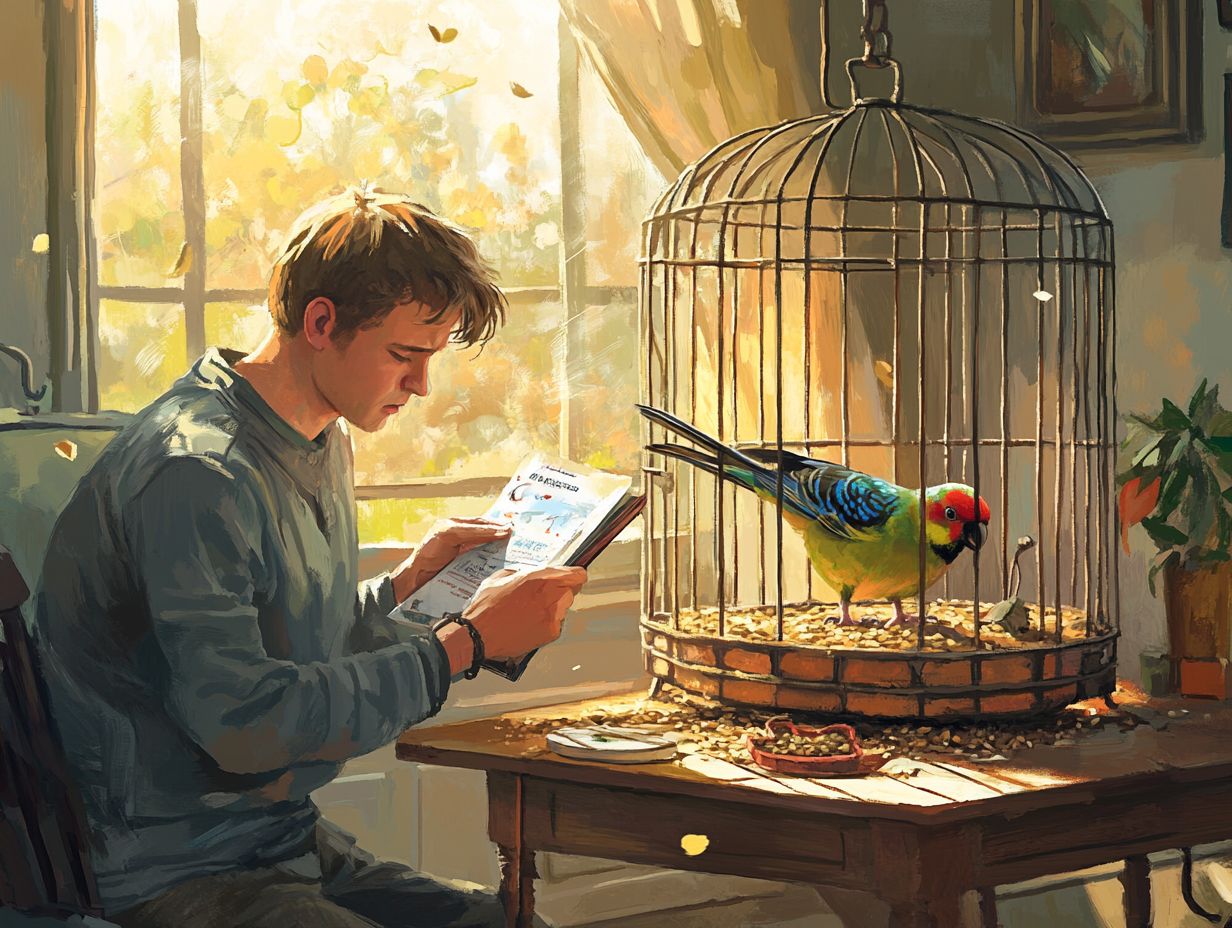
Socializing and training your bird can significantly enhance its mental stimulation. This fosters a harmonious relationship between you and your feathered friend, promoting its well-being.
Engaging in these practices lays a solid foundation for effective communication and trust. Start training your avian companion at a young age for the best results.
Use positive reinforcement rewarding good behavior with treats or praise to create a nurturing learning environment. Incorporating interactive toys and activities keeps birds curious and playful, making training both educational and enjoyable.
These techniques build essential skills and deepen the bond between you and your bird, elevating your connection.
What Are Some Ways to Provide Mental Stimulation for a Bird?
Providing mental stimulation is crucial for birds’ emotional and psychological well-being. You can achieve this by selecting bird toys, diverse perches, and engaging interactive activities.
Think about various types of bird toys like foraging toys, chewables, and puzzles that meet each species’ unique needs. Small parrots thrive with toys that enhance their skill, while larger birds enjoy challenges that stimulate their intelligence.
Rotate these toys often to keep things exciting and fun for your bird. Activities like hide-and-seek or teaching simple tricks can elevate their mental engagement.
Changing perches frequently adds both physical and mental enrichment to their space, ensuring their habitat remains fresh and inviting.
What Are the Best Practices for Cleaning and Maintaining a Bird’s Living Space?
Implementing best practices for cleaning and maintaining your bird’s living space is essential. It prevents bacteria buildup and ensures optimal air quality, both key factors that directly impact your exotic bird’s health.
Establish a routine cleaning schedule. Aim for a thorough clean at least once a week, complemented by daily spot cleaning to manage droppings and food debris. Start by gently removing your bird from its cage and placing it in a safe, temporary spot.
A mixture of vinegar and water works wonders for disinfecting surfaces, effectively eliminating odors and harmful germs.
For stubborn stains, use Dawn dish soap; it’s gentle yet effective. You might also want to explore grapefruit seed extract for its natural antibacterial properties. This routine maintenance keeps the living space fresh and creates a healthier environment, allowing your feathered friend to thrive.
Frequently Asked Questions
Act now to ensure your bird’s happiness! Don t wait to give your feathered friend the best care possible!
What are the 5 common mistakes new bird owners make?
1. Not doing enough research before getting a bird. New bird owners often underestimate the care and attention birds need. Always research common mistakes in bird training and your bird’s specific needs before bringing one home.
2. Not providing a proper diet. Many new owners are unaware of their bird’s dietary needs. An improper diet can cause health issues like vitamin deficiencies and obesity. For new bird owners, following essential care tips for newly adopted birds is crucial to ensure their health and well-being.
3. Not providing enough mental and physical stimulation. Birds are smart creatures that need mental engagement to thrive. For insights on how to ensure your feathered friend adjusts well, consider these 5 tips for transitioning your bird post-adoption. Without toys and interaction, they may develop behavioral problems.
4. Not properly socializing the bird. Birds thrive on social interaction with their owners. Without this, they may become fearful or aggressive towards humans. Additionally, avoiding common mistakes when buying bird toys can also help enhance their well-being.
5. Not taking the bird to a veterinarian. Many new owners don’t realize the importance of regular vet check-ups. Taking your bird to the vet only when it’s sick is not enough. Avoiding common mistakes when setting up bird cages includes ensuring they receive regular check-ups, which can help catch health issues early.

